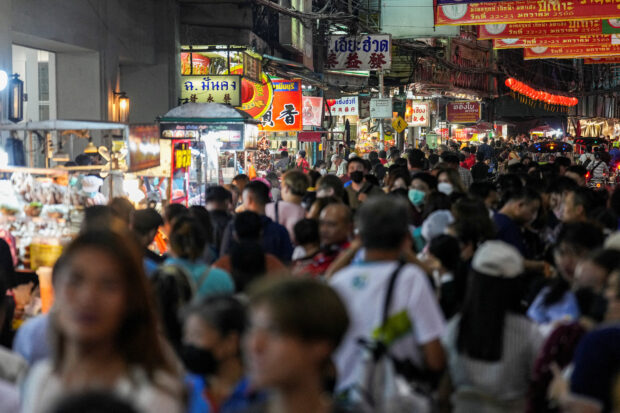Thailand, Malaysia, Singapore lure Chinese with visa-free travel

Tourists shop for street foods ahead of Lunar New Year celebrations in Bangkok’s Chinatown, Thailand, Jan 19, 2023. REUTERS/Athit Perawongmetha
SINGAPORE/BANGKOK —Chinese engineer and aviation enthusiast Wei Ming is exactly the kind of visitor the tourism authorities in Singapore, Malaysia and Thailand are looking for.
After Singapore scrapped visas for Chinese citizens, Wei, 44, said he ditched plans to go to Australia and booked a six-day holiday there instead. He said he also looked into visiting Bangkok and Kuala Lumpur, the two other visa-free Southeast Asian countries, but decided on the city-state because of the Singapore Airshow, which opens to the public on Feb 24.
As thousands of Chinese prepare to go abroad during the first Spring Festival holiday since Beijing lifted pandemic travel restrictions last year, Singapore, Thailand and Malaysia are hoping their unprecedented visa waivers will lure a large proportion of these visitors – and their much-needed spending.
Chinese travelers often complain about the length of time and the hassle it takes for them to obtain travel visas, and their passport is 62nd on the Henley Passport Index, which ranks the passports of 199 countries according to the number of destinations their holders can access without a prior visa.
READ: Thailand, China sign mutual visa waiver agreements
Article continues after this advertisementWhile waiving visas can make a destination more attractive, China’s slowing economic growth, job uncertainties and decline in income this year are likely to temper any outbound travel, analysts say.
Article continues after this advertisement“There is a feeling that the economic hardships and lack of disposable income are hitting much harder than in other parts of the world and that any travel is therefore staying within China where costs are lower,” said John Grant, chief analyst at travel data firm OAG, adding that the three Southeast Asian countries “may be looking for the trickles.”
Big spenders
Before the pandemic, Chinese tourists were a vital source of revenue, accounting for more than a quarter of all holiday makers to Thailand in 2019. Chinese visitors were also the top spenders in Singapore, splashing out over S$4 billion ($3 billion) that same year.
Even though fewer Chinese are travelling than before the pandemic, Chinese account for the bulk of visitors to Thailand, which launched its visa waiver in September, and tourism authorities there say they expect 177,000 Chinese tourists for the Lunar New Year holiday, more than three-times 2023 levels.
“The direction has been good since the visa free program,” said Chattan Kunjara Na Ayudhya, deputy governor at the Tourism Authority of Thailand. “It’s starting to get back to pre-pandemic levels.”
READ: Singapore, China plan reciprocal 30-day visa-free entry–media
Malaysia’s visa-free deal for Chinese started in December, and it is hoping to attract five to seven million Chinese visitors this year, which would be almost double pre-pandemic levels.
For the Lunar New Year, hotels including those under The Ascott Limited group, are launching promotions such as discounts and special activities and snacks for the festival.
Because of its status as an Asian air traffic hub, Singapore is ahead of its Southeast Asian rivals in flying in Chinese visitors, with the number of direct flights connecting mainland China rising nearly 5 percent this month from the same month in 2019.
Both Malaysia and Thailand still have far fewer direct flights: 33 percent and 17 percent less than 2019 levels respectively, data from aviation analytics firm Cirium shows.
($1 = 35.5200 baht) ($1 = 1.3428 Singapore dollars)